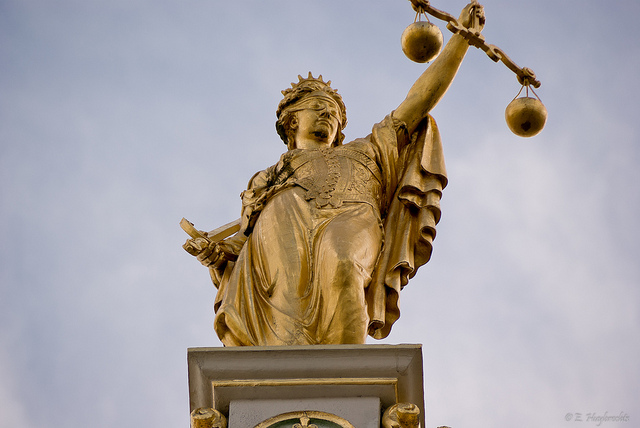
What is Equity?
March 11, 2014
Legalising Same Sex Marriages
April 10, 2014Section 9 Wills Act 1837 sets out the formalities that testament must comply with to be valid, these are construed strictly by the courts in order to ensure that a testator is genuine and that the will is not fraudulent. The provision clearly states that if you want to leave a testament, a testator must do so in writing, ensuring that everything that he/she wants to be passed on is in the testament; anything that is left out, will not be passed on. The will must then be signed in front of two witnesses. Wills are public documents for a reason and the purpose behind this statute is to make sure that citizens do not defraud wills.
However, many have dared to undermine this statute. The more private and secretive citizens amongst us can create a secret trust in their wills. There is no doubt that this alleyway into strictly applied probate law has had some good, the case of Katherine, Duchess of Suffolk v Herenden (1560) is a clear demonstration of a time in our legal system where the law did not allow a man to leave property to woman, the only way around this injustice was to cleverly swerve around the rigid corners of the law and create a secret trust.
A fully secret trust is a trust that on the outset appears to be an outright gift from a testator, there is no evidence of its existence on the face of the will, hence why it is called a fully secret trust. An example may help clarify this: A rich man may want to leave money to his mistress upon his death, but does not want to put it on his will because then his wife will become aware of his infidelity. So then we have this doctrine of secret trusts; on the face of the will the trust does not exist and the trust is held in secret for the mistress by – for example – a friend of the testator. This completely contradicts the writing requirement in Section 9 Wills Act, but judges justify this conflict with the law through the Fraud and Dehors theories. In practice, this means a beneficiary cannot enforce a secret trust through a will, fully secret trusts are solely justified and governed through the equitable jurisdiction; so by the law of trusts as oppose to probate law.
According to the fraud theory, equity will not allow a testator or secret trustee to deny the existence of a trust because of statutory guidelines, hence equity’s maxim: ‘Equity will not permit statute to be used as an instrument of fraud.” As per McCormick v Grogen (1869) LR, what this also means is that a secret trustee cannot defraud a testator and keep the property for himself.
The alternative justification for fully secret trusts is the Dehors theory, which essentially argues that a fully secret trust can lawfully exist – despite the Wills Act – because fully secret trusts are not a testamentary disposition, they are outside of a will and are therefore not classifiable under s. 1 of the Wills Act 1837. They are therefore not subject to Section 9. The ‘au dehors’ (outside) nature of fully secret trusts is demonstrated in the Re Keen (1937) Ch case which involved sailors who were sailing on orders written in a letter which was sealed. The question for the courts was whether the sailors were sailing under orders – even though the letter in the envelope was unread – and they didn’t know exactly what those orders were.
Modern academics have however argued strongly against the dehors theory. Patricia Critchley for instance argues that fully secret trusts are in fact testamentary dispositions, and that the theory has negligently misunderstood “outside the will”, with “outside the Wills Act.” It is not difficult to understand why Critchely sees no different between the wills and fully secret trusts. Common law makes it clear that a trust is irrevocable (subject to very minor exceptions that give the testator a right to revoke) and a will is revocable and amendable. Secret trusts should therefore be irrevocable if they are not part of a will, but just like wills, they too are revocable because property in a secret trust will also only pass when the testator dies.
Despite direct conflict with statute, our judges keep making decisions and enhancing case law in support of their existence. It seems as if the law is being shaped for uses that have not been made clear. For instance, in Ottaway v Norman (1972) Ch it was held that that a fully secret trust concerning land can be made orally, even though this entirely contradicts Section 53 (2) Law of Property Act 1925 which strictly requires such transfers to be via writing. This example supports the argument that a fully secret trust operates – ‘au dehors’ – the will, because if they were a part of the will, they would need to comply with Section 53(2).
Supporting the ‘au dehors’ argument is the possibility that a fully secret trust can also exist in inter vivos trusts (trusts operating during the testators lifetime), which would technically mean they are not subject to the Wills act because they do not have a testamentary disposition. In Re Tyler’s Fund Trusts (1967), Pennycuick J added to this point by saying that whether this is true or not, is unclear and inconclusive as case law regarding fully secret trusts has always been that way. As pointed out in Nichols v IRC (1973), there is no reason why, technically – on the assumption that they operate outside trusts – that statute and equity would not permit secret trusts to therefore exist in inter vevos trusts also. That said however, this is a debate that cannot be concluded unless a case dealing with an inter vivos arises in the future.
Immune as they seem to regulations, fully secret trusts still have three particular rules which they must comply with in order to exist, all three of which are set out in the Ottaway v Norman (1972) Ch case. As was outlined in McCormick v Grogan (1869) LR, there must firstly be a clear intention, the testator shows this intention by giving the trustee clear instructions which tell him exactly what to do with the property and who it is being held for; as per Moss v Cooper, the trustee must be given actual instructions as opposed to a being afforded a discretionary duty. The final requirement is acceptance from the secret trustee; it is irrelevant if this acceptance occurs before or after the date of the will. These three requirements further support the argument that fully secret trusts operate ‘au dehors’ and therefore can exist because they demonstrate that what is being asked of from the trustee is much more personal and different from what is asked of from a normal trustee in a will. It is therefore essential that clear instructions are given, as there is no will to direct the transfer to the true beneficiary and they must genuinely accept their duties themselves because they do not have a duty under a testament to pass the property and not keep it for themself.
In defiance of its name, a fully secret trust does not only fail to comply with statute; it does not even comply with the basic elements of equity’s law on trusts. Re Gardner No. (1923) 2 Ch set authority that if the beneficiary dies before the testator, the interest does not then lapse as it would in a normal trust and it would not result back to the testator who with accordance to the law still has legal title over the property; instead the benefit still passes to the beneficiary’s estate. This is because once the three requirements (intention, communication and acceptance) have been satisfied; a fully secret trust is valid.
Evidently, there is very little credible legal basis for the existence of fully secret trusts, but they certainly do and that is somewhat of a mystery.





